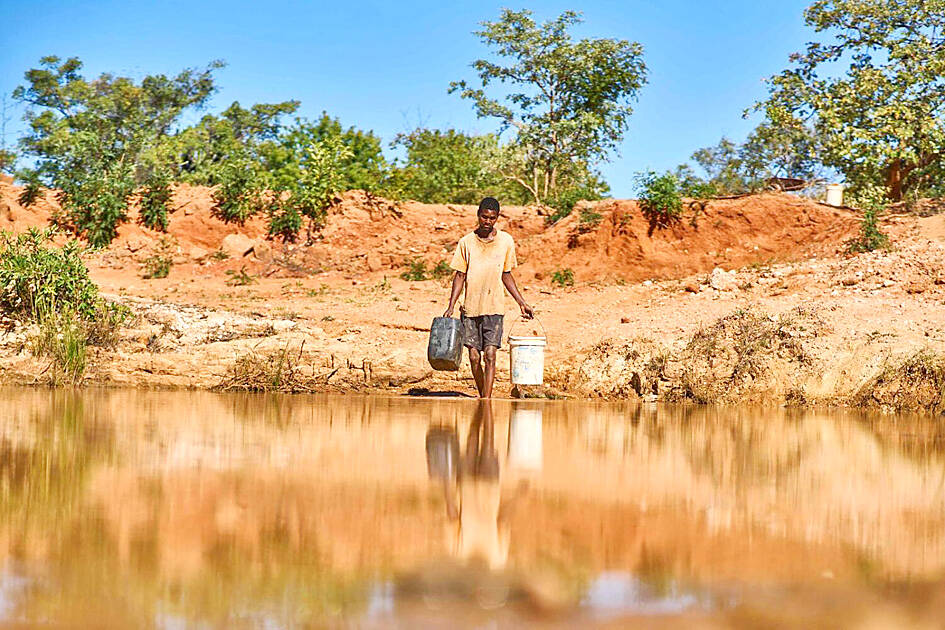In the worst drought in southern Africa in a century, villagers in Malawi are digging for potentially poisonous wild yams to eat as their crops lie scorched in the fields.
“Our situation is very dire, we are starving,” 76-year-old grandmother Manesi Levison said as she watched over a pot of bitter, orange wild yams that she says must cook for eight hours to remove the toxins.
“Sometimes the kids go for two days without any food,” she said.

Photo: AFP
Levison has 30 grandchildren under her care. Ten are huddled under the thatched roof of her home at Salima, near Lake Malawi, while she boils up the unpalatable yams known locally as mpama.
“It is a root that grows in the wild which we dig up so that the kids can at least have something to eat for the day,” Levison said. “People have died or fallen sick from eating this, so you have to make sure that it cooks for a really long time, all the time replacing the cooking water so as to remove the poison.”
The rains stopped in this part of Malawi in April and the crops burnt in the fields, Levison said.
The next harvest is due in March next year, said the head of the village of 1,000 people about 80km northeast of the capital, Lilongwe.
“People here are distressed because of hunger and the situation is really desperate,” Samuel Benjamin said.
Malawi is one of the world’s poorest nations and most of its people depend on rain-fed agriculture for food.
This year’s drought, exacerbated by the El Nino weather phenomenon, is affecting 44 percent of Malawi’s crop area and up to 40 percent of its population of 20.4 million, the World Food Programme (WFP) has said.
About 5.7 million people would need help to get enough to eat between next month and March next year, the Malawian Department of Disaster Management Affairs said.
The situation is equally dire about 250km south of Salima in the Chikwawa area, near the commercial capital, Blantyre.
“In a good year, we usually harvest 21 bags of maize, but this year we harvested absolutely nothing,” 72-year-old villager Wyson Malonda said. “However, we did not give up. We planted drought-resistant millet, but that too did not yield.”
His wife, Mainesi Malonda, 68, said villagers in the entire Shire Valley region have resorted to eating a wild water lily tuber known as nyika. These tubers are not toxic, but grow in crocodile-infested areas along the Shire River.
The drought slashed this year’s maize crop in Malawi by 23 percent from that of last year, WFP country director Paul Turnbull said.
It is the third consecutive year of poor harvest after damage caused by Tropical Storm Anna in 2022 and Cyclone Freddy last year. Impacts of El Nino include a 40 percent increase in moderate cases of acute malnutrition in children younger than five and a 23 percent increase in severe cases, the WFP said in its July brief.
Malawian President Lazarus Chakwera in March appealed for US$200 million in food aid when he declared a state of natural disaster in 23 of Malawi’s 28 districts because of the drought.
“It would have been catastrophic even if this were the first disaster in recent years,” Chakwera said.
The disaster management department is using government and international aid to buy and distribute maize to affected communities in a program that would cost about US$1.1 million, director Charles Kalemba said.
“We will also do cash transfers to the affected communities from mid-September starting with the most affected districts,” he said.
Five nations in southern Africa have declared a state of national disaster over the El Nino-induced dry spell — a disaster affecting at least 27 million people in a region where many rely on agriculture to survive, the WFP said.

MONEY GRAB: People were rushing to collect bills scattered on the ground after the plane transporting money crashed, which an official said hindered rescue efforts A cargo plane carrying money on Friday crashed near Bolivia’s capital, damaging about a dozen vehicles on highway, scattering bills on the ground and leaving at least 15 people dead and others injured, an official said. Bolivian Minister of Defense Marcelo Salinas said the Hercules C-130 plane was transporting newly printed Bolivian currency when it “landed and veered off the runway” at an airport in El Alto, a city adjacent to La Paz, before ending up in a nearby field. Firefighters managed to put out the flames that engulfed the aircraft. Fire chief Pavel Tovar said at least 15 people died, but

LIKE FATHER, LIKE DAUGHTER: By showing Ju-ae’s ability to handle a weapon, the photos ‘suggest she is indeed receiving training as a successor,’ an academic said North Korea on Saturday released a rare image of leader Kim Jong-un’s teenage daughter firing a rifle at a shooting range, adding to speculation that she is being groomed as his successor. Kim’s daughter, Ju-ae, has long been seen as the next in line to rule the secretive, nuclear-armed state, and took part in a string of recent high-profile outings, including last week’s military parade marking the closing stages of North Korea’s key party congress. Pyongyang’s official Korean Central News Agency (KCNA) released a photo of Ju-ae shooting a rifle at an outdoor shooting range, peering through a rifle scope

South Korea would soon no longer be one of the few countries where Google Maps does not work properly, after its security-conscious government reversed a two-decade stance to approve the export of high-precision map data to overseas servers. The approval was made “on the condition that strict security requirements are met,” the South Korean Ministry of Land, Infrastructure and Transport said. Those conditions include blurring military and other sensitive security-related facilities, as well as restricting longitude and latitude coordinates for South Korean territory on products such as Google Maps and Google Earth, it said. The decision is expected to hurt Naver and Kakao

Gaza is rapidly running out of its limited fuel supply and stocks of food staples might become tight, officials said, after Israel blocked the entry of fuel and goods into the war-shattered territory, citing fighting with Iran. The Israeli military closed all Gaza border crossings on Saturday after announcing airstrikes on Iran carried out jointly with the US. Israeli authorities late on Monday night said that they would reopen the Kerem Shalom crossing from Israel to Gaza yesterday, for “gradual entry of humanitarian aid” into the strip, without saying how much. Israeli authorities previously said the crossings could not be operated safely during